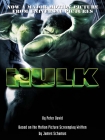Hulk, Peter David [best ereader for academics .TXT] 📗

- Author: Peter David
Book online «Hulk, Peter David [best ereader for academics .TXT] 📗». Author Peter David
But go explain that to number crunchers searching for some sort of mythical bottom line, as if one could put a price tag on progress.
These meetings were the only time that Betty envied Bruce his emotional detachment. She always maintained a cool demeanor when dealing with these people, but it required tremendous effort. Bruce accomplished the same thing but made it look easy . . . probably because, for him, it was. Betty gave herself a mental, if ironic, pat on the back. It took some kind of woman to find a silver lining to a character trait that effectively torpedoed a relationship.
She let none of what was going through her mind show in her presentation, of course. She was far too professional for that. Instead, she watched the fifteen or so men—all in their cookie-cutter suits and neckties—grouped around the table, studying the results and charts she had provided them on the well-founded assumption that they wouldn’t have a clue what she and her colleagues did without visual aids. She was walking them through it, reminding herself that she shouldn’t have any resentment toward them simply because at least half of them knew nothing about science, and only understood dollars and cents. They were . . . a necessary evil.
With a pleasant smile affixed to her face, Betty continued, “To distance the cells we subject them to gamma radiation.” Behind her on a projection board mounted on the wall, there were clear color representations of the cells agitating and unraveling. “Our little molecular machines—the nanomeds—are inhaled into the organism and spread through its tissues. They remain inert until we awaken them with gamma radiation. Once awakened, they instantly respond to the cellular distress signals—from a wound, for example—making copies of healthy cells and breaking down the damaged ones.” She paused to see if they comprehended. It was darker in the room than she would have liked, and it wasn’t easy to discern their faces, but she thought they got it. In the meantime, the image on the board displayed the nanomeds at work.
“The main problem,” she continued, “is figuring out how a living body can withstand the help our nanomeds provide so vigorously. We’ve yet to find anything that can survive not only the energy flux of such swift cellular replication, but the discharge of the waste products, mainly water and carbon dioxide, created as damaged cells are dismantled.”
Puckishly, she’d wanted to include a graphic of an exploding frog, just to see their reactions. The humorous notion had been vigorously vetoed by Bruce and Harper, and so instead the board members only witnessed a cellular explosion. “We’re trying to balance these two functions,” said Betty. “If we succeed, we may someday realize the promise of near-instantaneous bodily repair.” She looked to Bruce as she thought, There. Near-instantaneous bodily repair. That should be practical application enough for them. “Dr. Krenzler.” She gestured and Bruce rose and stepped up as she moved to one side.
She found to her surprise that she had to fight a reflex to reach up and squeeze his arm. It would have been meant in the simplest “go get ’em” terms, but she was worried it might be read as more than that—and, for all she knew, it was more than that. So she kept her hand at her side and just nodded to Bruce in a vague show of support. He returned the nod and stepped up to the small podium that had been erected.
“Thank you, Dr. Ross,” Bruce said, looking out over the room. He smiled slightly. Betty couldn’t help but think that this was exactly the sort of situation in which Bruce was the most comfortable. No emotions, no personal interplay. Pure lecture. He’d probably make a hell of a teacher. He tapped for a moment thoughtfully on the podium, and then said, “We’ve been thinking a lot lately, in the lab, about memory and forgetting, about the role they play in living and dying. Death, you might say, is a kind of forgetting.”
Betty glanced around the room. They seemed to be hanging on his words. Meanwhile, Bruce, warming to his topic, continued. “Each time a human cell replicates, it loses a little more DNA from the end of its chromosomes, eventually forgetting so much it forgets its function, its ability to cope with trauma, to continue to reproduce. Whereas life, life is the ability to retrieve and act on memory.” He moved slightly away from the podium, leaning against it on one elbow, looking very casual. He’s so much more comfortable with science than people, Betty sighed mentally, as Bruce said, “Now if our work succeeds, and our nanomeds begin to take over more and more of this process, you’ll have to ask is it you that’s alive, or is it the billions of artificial creatures inside you?”
He paused. The interest from the men at the board table was palpable, and Betty could almost sense their next question: When would it be ready? When would it be available to distribute to hospitals and doctors and think tanks so we can make a ton of money off it? Bruce apparently sensed that, as well, for he drew a cautionary line in the sand.
“For now, our nanomedical cures have been more deadly than the diseases they treat,” he admitted. “Maybe that’s because they remember their instructions too well. Perhaps, to stay in balance and alive, we must forget as much as we remember.”
There was a pause. Then, from the darkness,





Comments (0)